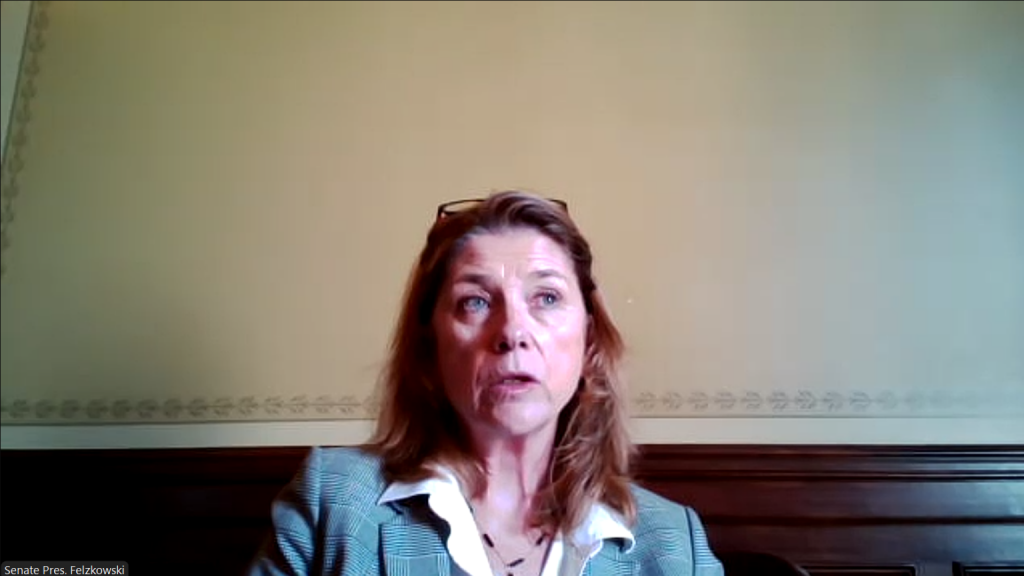‘We Still Hold the Majority’ Wisconsin GOP Senate President Warns
Are there any issues where Republicans and Democrats are likely to agree?

“Make no mistake, we still hold the majority,” Felzkowski said. “I hope we have better conversations. I hope we have better negotiations,” Senate President Mary Felzkowsi said. (Screenshot via Zoom)
New-elected Senate President Mary Felzkowski (R-Tomahawk) said Tuesday that she hopes for more bipartisan conversations next year, but that her caucus plans to operate in the same way it has previously, since Republicans still hold the majority in the Wisconsin Legislature, even after losing a handful of seats this election year.
The Legislature will return with closer margins next year following elections under new legislative maps. Republicans will have an 18-15 majority in the Senate, down from their previous 22-seat supermajority. In the Assembly Republicans will hold a 55-45 majority. Felzkowski made her comments during a WisPolitics panel Tuesday alongside Assembly Minority Leader Greta Neubauer (D-Racine) and two strategists — Keith Gilkes, a consultant and former chief political advisor for Republican former Gov. Scott Walker and Democratic strategist Tanya Bjork.
“Make no mistake, we still hold the majority,” Felzkowski said. “I hope we have better conversations. I hope we have better negotiations.”
Felzkowski said she would “love” to have more meetings with Democratic Gov. Tony Evers, noting that former Gov. Scott Walker used to conduct weekly meetings with lawmakers during his time in office. (During the Walker administration, Republicans controlled both chambers of the Legislature and Democrats accused them of breaking the law by meeting in secret with Walker.)
Democratic leaders have said that they believe there will be more opportunities for work across the aisle next year, and that more competitive legislative districts will encourage that.
“We’ve got some Republicans. We’ve got some Democrats who are in close, 50-50 seats,” Neubauer said during the panel discussion. “I expect that some in Republican leadership want things to continue as they have in the past, but I expect that a lot of those members who are in those difficult seats are going to be pushing to invest in K-12, to lower costs for working families, to take up popular policy.”
The state budget — and potential use of the $4 billion budget surplus — will be a major focus for lawmakers when they return in 2025. Writing the budget is a time when lawmakers discuss potential policy changes on a wide array of issues, and the potential funding that should be placed behind them.
Potential budget proposals and policy changes in wake of school shooting
Neubauer and Felzkowski discussed ways to address school safety, through policy changes and the budget, after a 15-year-old girl shot and killed a teacher and another student before turning the gun on herself at Abundant Life Christian School in Madison Monday. Six other people were injured in the school shooting.
“This is the deadliest school shooting on record in Wisconsin and it’s just an incredible tragedy. I know that people across the state are sending their good thoughts, of course, to those who were impacted but also really are looking for leadership in this time,” Neubauer said. She said proposals from President Joe Biden, who called for Congress to pass universal background checks, a national red flag law and a ban on assault weapons and high-capacity magazines, as well as new proposals from Wisconsin legislators in the state budget could be paths for improving school safety.
“In Wisconsin, for many years, we’ve been talking about red flag laws. We’ve been talking about universal background checks. These are policies that are widely supported by the people of this state, and I think in particular when it hits home for kids,” Neubauer said.
“For my school district here in the Racine area, they would really like to invest in school safety, there are important programs that they run, there are physical improvements that they would like to make, and I know that we’re going to be having a budget conversation very soon,” Neubauer continued. “I do hope that we’re able to keep in mind that investments in K-12 are also investments in school safety, and that’s a responsibility of the Legislature for the coming session.”
Felzkowski stopped short of endorsing the policy changes that Neubauer mentioned. She instead said that people need to look at what has changed in American society, adding that people also took guns to school 30 and 40 years ago.
“We went hunting after school and nobody was afraid. Nobody was afraid that they were going to get shot at school, so society has changed,” Felzkowski said. “I think we need to recognize those factors that have changed in our society.”
“We can pass a lot of different legislation, but we need to start looking at underlying causes…Is it social media? Is it cyberbullying? Is it too much screen time in our children? Is it violence that we’ve allowed them to watch at a young age?” Felzkowski asked. “I hope we can come together with a lot of tough conversations and look at that.”
Felzkowski said increasing weapons screening in schools could also be a point of discussion.
“Those are conversations that we should have in this budget to help fund ideas, so that people can’t walk through the door with no screening,” Felzkowski said.
Spending the surplus, funding priorities
The state’s $4 billion budget surplus will likely be a key point of discussion during the budget writing process. Felzkowski said that when it comes to the surplus Republicans will “do exactly what we did last time,” and don’t plan on using the money for recurring projects.
“If the majority of this is one-time money we’re going to spend it on one-time projects,” Felzkowski said. “One-time money should be spent on infrastructure. Instead of borrowing, we’ll spend it on our roads. We’ll spend it on maintaining our buildings.”
Felzkowski said during the budget process, lawmakers will survey current spending costs and what funding could be needed for other priorities. She said returning money to taxpayers would also be a priority.
“If we have a $4 billion surplus, then we have too much of our taxpayers’ money; we can return it to them,” Felzkowski said.
Felzkowski added that the government didn’t choose for property taxes to rise in certain communities. Her comments follow a Wisconsin Policy Forum report that found gross K-12 property taxes in the state are expected to rise by the largest amount since 2009. She said she voted in favor of raising property taxes in her own community.
“When people vote at the local level to increase their taxes, their property taxes, that’s a decision they make, and that’s a decision they choose to make,” Felzkowski said. “I don’t think that’s government making that decision for them and I think that’s something they can do.”
Neubauer said Assembly Democrats would be open to conversations about tax cuts, if they’re targeted.
“We’re just simply not gonna give a tax cut to the wealthiest Wisconsinites and people who do not need it. We are very open to considering a tax cut that is targeted, that is focused on middle class and working families,” Neubauer said. She said also that people in their communities are being “forced to raise their own property taxes in order to fund their schools.”
Felzkowski didn’t specify what potential tax cut proposals would look like, but noted that Evers “moved the needle” for what he considered a middle class tax cut when he vetoed some tax cut bills lawmakers sent him earlier this year. Those proposals included raising the top income in the state’s second-lowest tax bracket to just over $112,000, exempting up to $150,000 in retirement income from the state income tax and increasing the current maximum marriage tax credit. Evers did sign a law increasing Wisconsin’s child care tax credit.
“If Gov. Evers continues to move the needle on what ‘middle class’ is, then we’re kind of at a loss,” Felzkowski said, adding that some families struggling financially could use a tax cut. “We gave [Evers] the tax cut and he still vetoed it. I’m hoping that that needle doesn’t move again.”
Several policy proposals are likely to be discussed next year in relation to the budget, including for Medicaid expansion and higher education. States that accept the federal Medicaid expansion agree to cover people with incomes up to 138% of the federal poverty guideline, and the federal government pays 90% of the cost for the additional Medicaid recipients, more than the 60% Wisconsin currently receives.
Evers has proposed that Wisconsin join 40 other states across the country in adopting the Medicaid expansion every budget cycle, and Republicans have rejected the proposal each time. Felzkowski said that it remains off the table for Republicans.
“We don’t have a gap in Wisconsin, so why would we take people off of private insurance to put them on government insurance and put our hospitals, who are already suffering, into a worse position with a lower reimbursement rate?” Felzkowski said. “We don’t need to create more gaps in health care when we have people covered.”
Neubauer said that Medicaid expansion would continue to be a priority for Assembly Democrats. She said that some insurance remains a “huge strain” on families with private insurance.
“They frankly are not able to afford it. They are cutting in other areas to afford that insurance,” Neubauer said.
Higher education will also be a focus of budget discussions as the UW System has requested an additional $855 million to bring the system up to the national median in state spending. Felzkowski said that she hasn’t heard much support for the proposal.
Other issue areas
Lawmakers may also turn their attention back to medical marijuana legalization this year. Felzkowski said that there was one person standing in the way of getting it done last session: Assembly Speaker Robin Vos.
“That person has some pretty strict ideas on how that bill should be drafted,” Felzkowski said. Vos’ proposal last session included opening a handful of state run dispensaries, an unpopular idea among many in the Legislature. “We’re hoping to have a conversation in early January to see if there isn’t a way that we can come to a consensus between Assembly Republicans and Senate Republicans to negotiate a compromise.”
Felzkowski said that a bill to allow “Monday processing” of absentee ballots could also come forward next session. A proposal to allow election clerks to begin processing absentee ballots on the Monday before the election passed the Assembly last session but never advanced in the Senate.
“There are many senators that were very much in support of that. The chair of the Senate elections committee was not and chose not to hear that. He is no longer a member of the Senate,” Felzkowski said. Sen. Dan Knodl, who served as chair of that committee, chose not to run for reelection under the new legislative maps, but will serve in the Assembly next year. “I’m hoping this year that we will have a committee hearing on that bill if it’s brought back and that we have a robust conversation on that. I personally think that is something that we should be doing in the state of Wisconsin.”
‘Make no mistake, we still hold the majority’ says Wisconsin GOP Senate president was originally published by Wisconsin Examiner.






















For a plain-sense budget, i.e., what to do with budget surplus:
A targeted tax cut that is focused ONLY on middle class and working families.
Medicaid expansion. Please.
Maintaining roads. Please.
Increasing weapons screening in schools.
Can Urban Milwaukee please have a poll on reader’s top choices for what to do with the budget surplus?
I might be mistaken, but isn’t the “budget surplus” only about 6 weeks of expenditures for Wisconsin, based on the annual budget?
That is not a significant windfall. It barely qualifies as a rainy day fund.
Also, a one time surplus cannot be considered for any ongoing budget items, as it won’t be available, the next time around.
The article says that the budget surplus is 4 billion dollars. Even if this is “one-time”, it can be used for road maintenance and installing more weapons screening in as many schools as possible. Both are clearly needed.
You’re right that the budget surplus wouldn’t cover Medicaid expansion or a targeted tax cut for lower income folks. Not sure what the mechanism is to get them, but they are a critical and important unmet need in this state. Way more important than a new street plaza or more lights on the Hoan…
The current budget surplus is $4.6 billion. At the end of 2023 it was over $7 billion. 2022 was $6.6 billion. There is a trend here, and while I would much rather live in a state where there is a fiscal year surplus than deficit, I can’t help but think how many communities have been forced to increase their own property taxes to fund schools.
We taxpayers are little lambs, being fleeced by our state and local governments who use the “but it’s for our kids” guilt trip to squeeze just a couple more drops of blood from the stone.
Does anyone out there who went to school in the 1989s or 1990s remember their fellow students bringing guns to school so they could go hunting when they got out? This statement from Senator Felzkowski would go into the same class as immigrants eating cats in Ohio. As usual, the Republicans have no meaningful response to the Madison shooting. How about a State law that demands that handguns in homes with minors must be locked up unless being used by an adult?
Sen. Felxkowski promises more of the same MAGA do-nothing BS. What has the GOP majority done with their gerry-mandered majorities since 2010? Feed the rich, destroy our public education system and kill thousands by not expanding Medicare. Oh, and school shootings? Bring your guns to school like in the “good ol’ days”…. WTF
Responding to rubiomon:
What you listed is actually the GOP agenda. Their plans include removing anything that benefits ordinary citizens, who are not ultra-rich. Neoliberalism at its finest, with the stated objective to get rid of democracy.
rubiomon:
You are right on the money! Felzkowski’s comments about hoping to have better conversations and better negotiations imply the usual iron fisted positions we have had shoved down our throats for 14 years. Her further assertion that “we still hold the majority” is indicative of someone that really has no intention of negotiating anything. Her plan seems to be that things will be the way the GOP-ers want them, or else. Same BS message. Different BS messenger.
Also, I was in grade school in the ’60’s. Middle and high school in the ’70’s. We couldn’t bring a scissors to school, much less a freakin’ gun! Maybe where she grew up kids needed to shoot a rabbit or a squirrel on the way to school to eat for lunch!